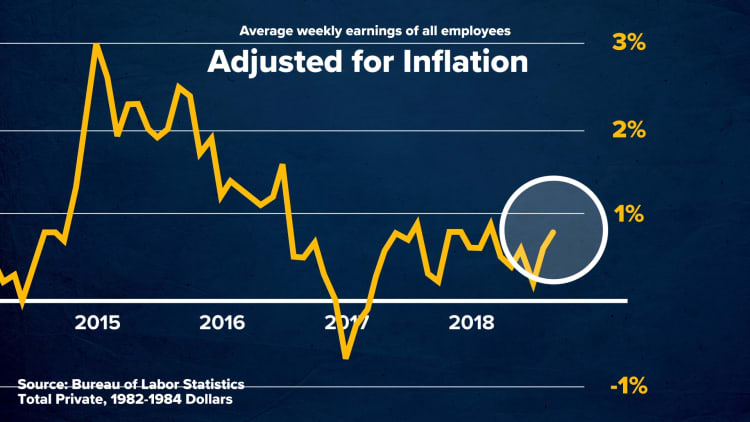You may have heard that wages are finally starting to go up — and they are. The latest number from the Bureau of Labor Statistics shows growth of more than 3 percent, the highest in almost a decade.
But there's a big caveat to this number. It's not adjusted for inflation.
When taking that into account, wages are growing less than 1 percent faster than inflation. And this holds across a few different measures of compensation.
How could it be, with unemployment so low, that workers aren't demanding and receiving more pay?
Federal Reserve Chairman Jerome Powell called the issue "a bit of a mystery" just last month. And it's an issue the U.S. economy has been dealing with for years — a big missing element of the recovery since the Great Recession.
Some economists point to less worker bargaining power as a potential reason. Between weaker unions and increasing market concentration across a number of industries, it's harder for employees to boost their pay.
Jared Bernstein was the economic advisor to Vice President Joe Biden and deputy chief economist at the U.S. Department of Labor during the Clinton administration. He told CNBC, "Workers just don't have the bargaining clout that they had in the past to go into their boss's office and say, 'Hey – It looks like our company is doing great, how about a pay raise?'"
But there's another factor. There are a lot of people still on the sidelines after the recession. The Civilian Employment-Population ratio has not recovered like the unemployment rate.
Phillip Swagel was an assistant secretary for economic policy at the Treasury Department under George W. Bush and now teaches at the Maryland School of Public Policy. He said people who may have been retired or even disabled are coming back into the labor market to find jobs. And it doesn't even stop there.
"There are millions of Americans who are recently incarcerated, who might not have the job skills, who might find it difficult to come into the labor market. But those are potential contributors to our society," Swagel told CNBC.
While it's good news that these people are finding jobs, that could be keeping wages lower than expected.
There are some signs of life. Just like minimum wage increases could have helped inflation-adjusted numbers in 2015 and 2016, major employers such as Amazon raising its minimum wage to $15 per hour could have ripple effects that will be positive for workers.
The big question is this: Will this wage recovery just take more time? Will baby boomers retiring for good lead to full employment and more upward pressure on pay?
Or has something structural changed in the economy that will keep wages depressed for years to come?
Perhaps only time will answer this economic mystery.



